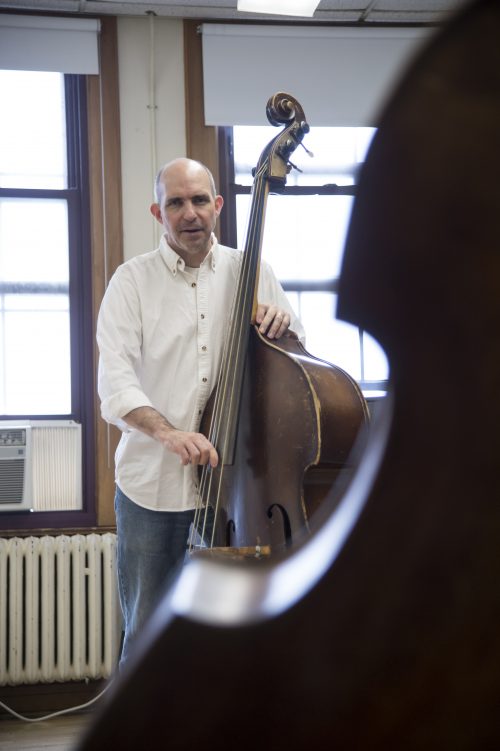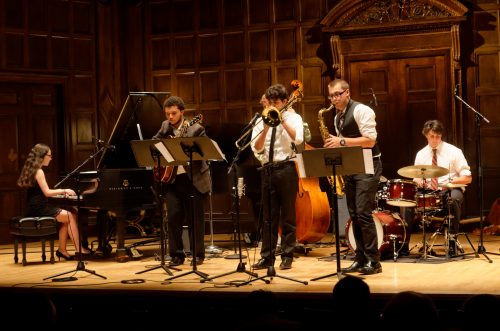By Hattie Bestul
Clarinetist Hattie Bestul is currently completing her Master’s degree in Performance and Literature at Eastman and working as an Arts Leadership Program intern at the Eastman Community Music School.
At Eastman’s Summer Jazz Studies, students play in jam sessions, learn jazz theory, try their hand with improvisation and composing, and perform in small groups and big band. Working with world-class faculty members, students build once-in-a lifetime relationships with new mentors, and the fully immersive setting leads to meaningful connections between passionate peers. Alumni note that the Summer Jazz faculty “gave me a lot to take home to incorporate and practice,” and that “some of the best learning came also from the friends I made in the camp.”
These young musicians are not only looking to play music, they are seeking a transformative experience. Students who explain their reasons for attending say, “I came to Eastman Summer Jazz Studies to become a better player and to gain insight into the life of an Eastman student,” and “I wanted to be in a place with extremely talented musicians, where I could grow and increase my experience, especially with very knowledgeable and talented teachers.”
Carrying on the decades-long legacy of this exceptional program is Summer Jazz Studies Director Jeff Campbell. As a professional bassist, Jeff is passionate about music and sharing his expertise with young musicians. During the school year, Jeff teaches and performs as Professor of Jazz Studies and Contemporary Media at the Eastman School of Music and as a member of the Rochester Philharmonic Orchestra bass section. I was able to sit down with Jeff to find out more about the Eastman Summer Jazz Studies experience:

Jeff Campbell, Associate Professor of Jazz Studies & Contemporary Media, leads a jazz master class at University of Rochester’s Eastman School of Music June 30, 2015. Photo by J. Adam Fenster / University of Rochester
What sets Eastman’s Summer Jazz Studies program apart from other summer music camps?
I think the fact that it’s intense, and it’s in the Eastman School’s great facilities. We get to play concerts in Kilbourn Hall and be in a place where there’s a tradition of striving for excellence. We have relatively small numbers – around 50 students generally – so there’s a pretty small student-teacher ratio. We also use essentially the same strategies for the camp curriculum that we do at the collegiate level.
Speaking of college, a number of Summer Jazz Studies students have noted their interest in the Eastman School of Music. Do you often have Eastman students who first came to camp here?
Oh, absolutely – every year. That’s such an important part of the application process, and it’s definitely a great opportunity for us to get to know each other.
Two weeks doesn’t seem very long – how much do students really take away from their time at Summer Jazz Studies?
In terms of their education, they do take away technical skills and theoretical knowledge. But mostly, they get inspired. They focus and advance their learning because it’s a concentrated environment. They find like minds – people who like the same recording or know about the same techniques – and they learn, “I’m not alone.” Of course as faculty members we hope they learn from us, but they also learn a lot from their fellow students. They get placed in a set environment where they’re pushed and there are no distractions. It’s really motivating.
An audition recording is required for Summer Jazz Studies. Do you have any insight for students auditioning this year?
I personally listen to about 150 to 200 audition recordings a year, so for me audition recordings need to be relatively simple and brief. The most important thing is musical clarity. I listen to a person’s sound, I listen to their capacity to play with good intonation, and I listen to clarity of musical thought. Those may sound like basic concepts, but they’re so important: focus on the fundamentals always pays off.
Most of the students note the importance of the relationships they find at the Eastman Summer Jazz Studies. What would you say is special about their time at camp?
We always tell our students that friendships they establish here will last for the rest of their lives. It’s a major part of the cultural experience in music because half of what we do here [at Eastman] is with our friends – people that we love. And there is something special about students who meet for the first time at a summer camp: we took my oldest son to a different camp right before he was headed to college. When we dropped him off we could tell he was really nervous, but then in walked another student he had gone to Eastman camp with. They were already friends, and it just quelled all of our concerns and his as well.
Those kinds of human-to-human stories, to me, are probably greater than the musical advancement – because not everyone is going to become a professional musician. Sometimes students come to camp saying I want to be a professional musician. Then after the two weeks here they may think, Well, I don’t know. I can see there are other people who are really serious about this. They have a certain level of commitment that I just don’t know whether I have. I think I’m going to become a biologist – or whatever it is. That’s still a win-win situation, because the student begins to understand what they want to pursue with more clarity. It’s okay if they don’t go into music, but they still have a wonderful experience and advance their learning.
Summer Jazz Studies runs July 1-13, 2018. Visit https://summer.esm.rochester.edu/course/summer-jazz-studies/ for more information.

